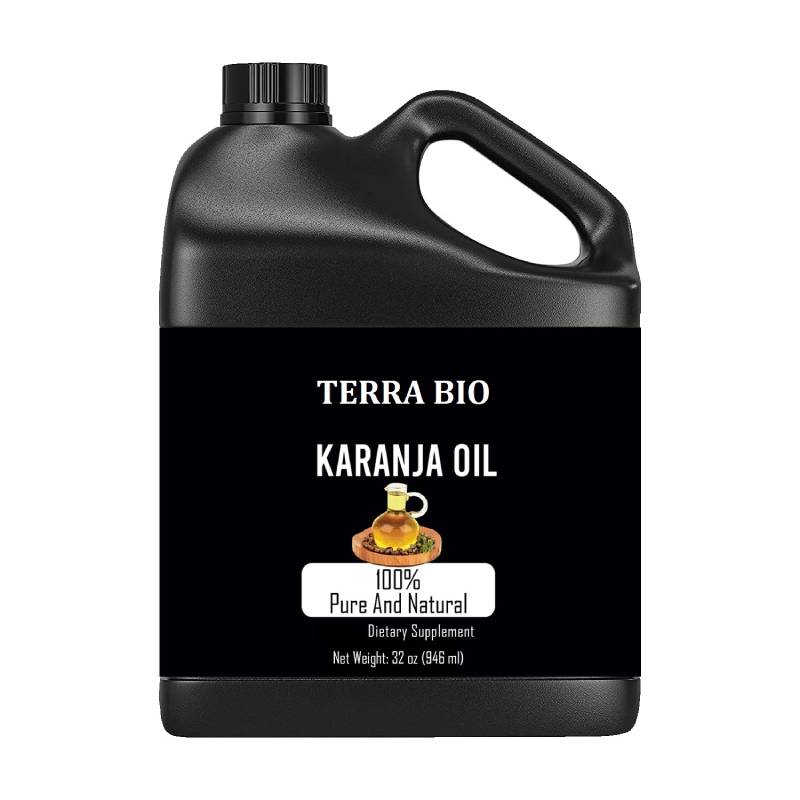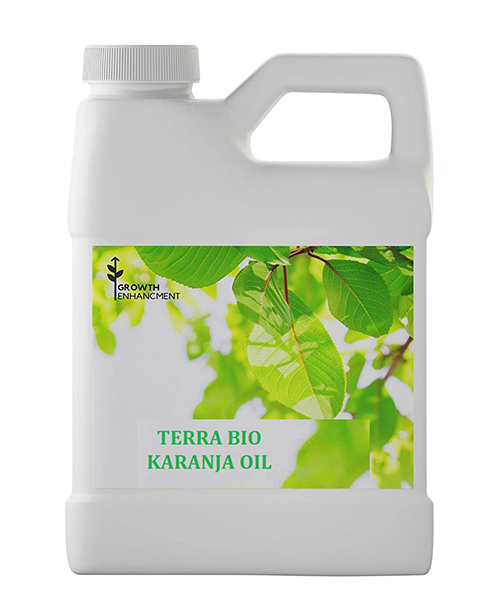Karanja Oil

Native from India, Organic Karanja Oil is cold pressed and double-filtered from the seeds of the Pongam Tree, also known as the Karanja Tree (Pongamia glabra). Karanja Oil is an excellent pesticide which controls the Nematodes like Neem Oil. It has a high content of triglycerides, and its disagreeable taste and odor are due to bitter flavonoid constituents including karanjin, Pongamol, tannin and karanjachromene. The cake after oil extraction may be used as manure.
It is being used to manufacture Bio pesticides, Bio insecticides all over world .Karanja oil contains the active ingredient called liminoid karanjin. Karanja oil is tested by HPLC to certify that the karanjin content is above 20,000 ppm. Karanja oil is also tested by TLC to make sure the absence of aflatoxin.
Karanja Oil contains natural plant growth-stimulating ingredients, primarily axins, improving soil texture and promoting vegetative growth, plant health and fruit yields.
Karanja Oil is prized for its insecticidal and antiseptic properties.
Ideal replacement for Neem Oil in areas where Azadirachtin is not allowed
Can be mixed in equal parts with Neem Oil to widen insect control
Lasts longer on plants than chemical insecticides
Cosmetic Industries

In skin care, Karanja Oil can be used to treat eczema, psoriasis, skin ulcers, dandruff, or to promote wound healing. Karanja Oil can be incorporated into body oils, salves, lotions, soaps, hair oils, shampoos, or garden sprays.
All parts of the plant have also been analysed due to its reported medicinal importance.
Pongamia pinnata (Karanja), grows extensively across India. The seed oil has been used by the natives of India for hundreds of years. It is used in Ayurvedic and Siddha traditional medicine systems to treat various skin conditions from eczema and psoriasis to leprosy, and for skin protection, as it is believed to enhance the UV absorbing properties of conventional sunscreens.
A paste made of Karanja and lime is used to relieve rheumatic pain,
and Karanja infused baths are used for cleaning skin ulcers and sores.
and Karanja infused baths are used for cleaning skin ulcers and sores.
PRODUCT SPECIFICATION – KARANJA OIL

| Sl | Parameters |
|---|---|
| Karanjan Content | < 20,000 |
| Specific Gravity | 0.925-0940< |
| Refractive index | 1.4734 - 1.4790 |
| Acid Value | 20 |
| Saponification Value | 186-196 |
| Iodine Value | 80-90 |
| Unsaponifiable matter | 3.0 |
| Fatty acid composition | % |
| Palmitic acid | 3.7 - 7.9 |
| Karanjan Content | < 20,000 |
| Stearic acid | 2.4 – 8.9 |
| Arachidic acid | 2.2 - 4.7 |
| Behanic acid | 4.2 – 5.3 |
| Lignoceric acid | 1.1 - 3.5 |
| Oleic acid | 44.5 – 71.3 |
| Linoleic acid | 10.8 - 18.3 |
| Eicosenoic acid | 9.5 – 12.4 |
| Shelf Life | 24 Months |
Bio-Diesel Process

karanja (pongamia glabra) seed has been studied as a potential source for biodiesel preparation. Karanja oil is extracted from the seed by different methods. Oil properties have been measured by standard methods. Acid catalyzed transesterification, acid catalyzed two-step method and three-step method have been studied for biodiesel preparation from karanja oil.
SHELF LIFE: 2 YEARS
PACKING TYPE

20Litre, 25Litre, 50Litre – HDPE PLASTIC DRUMS and CANS
100 ml, 250ml, 500ml, 1Litre, 3Litre, 5 Litre, 10 Litre – HDPE Cans
1000 Litres IBC Tank and ISO Tank (18000 – 19000 Litre) – Bulk Packing



